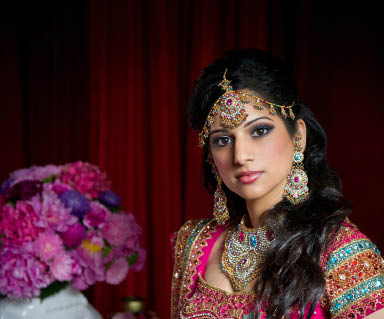Wearing heavy shimmering lehengas or saris in typical maroon or red shades for a summer-monsoon wedding is passe. An up-to-the-minute fashion statement is comfortable innovative bridal outfits made with nets, chiffons or chanderi silks in soothing shades like turquoise, green and rani pink.
While deciding on fabrics for sultry and sweaty weather conditions, designers focus on fabrics that breathe; nets, chiffons and chanderi silks fall in this category. Embellishments and embroidery too have got makeovers with sharper focus on intricate threadwork, beadwork, lace and patchwork.
Designers say such outfits are not only easy to carry off, but brides also look gorgeous in them.
“Modern day brides refuse to wear heavy embroidered outfits, decorated with gold, silver, crystals and precious stones. Instead, they go for soft and light fabrics like chiffons and satins with laces or vibrant beading and patchwork,” Delhi-based designer Ritu Beri said.
Beri, known for her exquisite designs and elegant cuts, says that “light-weight silhouettes are easy to wear and carry off. They also provide relief from the scorching heat. One should go for transparent fabrics and nets,” she added.
Blingy is certainly not the buzzword any more for brides-to-be.
Outlining the shifting preferences in bridal wear, designer Ritu Kumar said: “Women are moving away from the heavy embellishments and crystals, which are too shiny.”
“The present trend is to go for brocades for the lehengas but in bright colors so that the ensemble is both rich and not too weighed down.
Light weight chanderi fabric makes up for embroidery, which is mostly subtle threadwork and light tikki work,” added Ritu Kumar who is using using crapes, nets and fine flowy fabrics for her latest collection.
“These fabrics work well for summer; especially the see through look is important,” she said.
Although wedding outfits mostly depend upon a girl’s choice, Tarun Tahiliani, who has mastered the art of churning out high-end bridal wear, admits the shift in taste is evident.
“Indian bridal wear has always been heavy, but summer wedding wear does see a tilt towards lighter fabrics and colors which are cheerful and summery – suited to the weather,” he said.
For light-weight bridal wear, he felt that “georgettes, sheer silks and organza are preferred to heavier silks and brocades.”
The changing outlook of women has certainly brought a change in their tastes and preferences. Modern young girls do not any more confine themselves to traditional lehengas or saris or salwar-kameez to take their vows on their D-day.
Pointing out the change, Ritu Beri said: “They opt for elegant peplum gowns, elegant stitched saris and lehengas. Lavish use of fabrics, interesting textures and dupattas in different drapes are also very popular and in demand.”
While creating lightweight outfits, designers have to ensure the weave is right as weaving techniques play an important role in bridal outfits.
Ritu Kumar said she works mostly with Benaras woven mangalgiris, chanderis and gossamer jaamdaanis. “We have our own weavers who create the fabrics and do the embroidery,” she added.
Beri uses jacquard weaving while working with brocades, whereas Tahiliani mostly opts for hand-woven brocades and kinkhabs.
What about the trendy shades for bridal wear?
“Explore colors other than red and maroon. Many are opting for jewel tones like fuchsia, orange, emerald green, pastel shades like aqua blue, lilac and metallic tones and undertone in the bridal outfits. Silver and other ice cool shades are also replacing traditional earthy tones and hues,” said Beri.
Agreeing with Beri, Tahiliani said: “Pastels for morning weddings, burnt orange and burgundies for evenings are perfect.”
Ritu Kumar felt the look and color should be a fusion of bright and soft.
“The hues are corals, turquoises, lime greens and rani pinks. They are fresh and bright, not the dull looks associated with western looking pastels.”
The limited-edition high-end collections of the designers starts at Rs. 50.000 ($1,000).
So what are you waiting for? Take the experts’ advice and go for what suits you the best on your D-day — and not necessarily what’s conventional.
